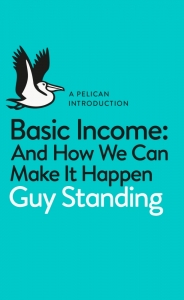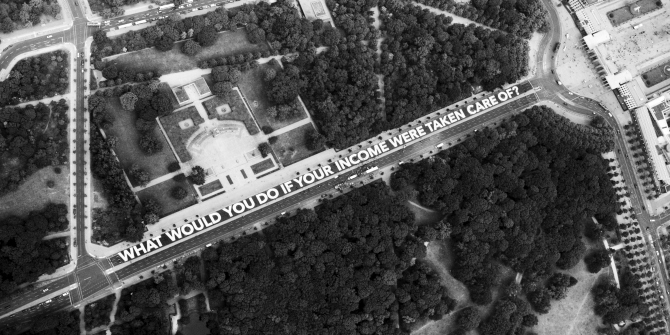Drawing on thirty years experience researching, testing, designing and advocating for basic income schemes, Guy Standing offers a concise and well-organised overview of their history, development, definition and implications in Basic Income: And How We Can Make it Happen. While the adoption of basic income by governments will ultimately depend on the results of pilots and emerging data, writes Christine Sweeney, this book effectively prepares readers to participate in the growing discussion surrounding this increasingly debated policy.
Basic Income: And How We Can Make It Happen. Guy Standing. Pelican. 2017.
Find this book (affiliate link): ![]()
 To reduce economic inequality, stimulate spending and update its social welfare system, a government decides to dedicate a portion of tax revenue to pay all citizens an average of £2,500, with children receiving less and pensioners receiving more. The amount is to be given universally, regardless of employment, health or family status. The amount is calculated based on a distribution of GDP and estimated costs of key goods like food, clothing and shelter. All citizens would have their most basic needs met, and any additional earned income would supplement their desired lifestyle and living situation.
To reduce economic inequality, stimulate spending and update its social welfare system, a government decides to dedicate a portion of tax revenue to pay all citizens an average of £2,500, with children receiving less and pensioners receiving more. The amount is to be given universally, regardless of employment, health or family status. The amount is calculated based on a distribution of GDP and estimated costs of key goods like food, clothing and shelter. All citizens would have their most basic needs met, and any additional earned income would supplement their desired lifestyle and living situation.
Utopian fantasy or viable policy solution designed to meet the economic challenges of the twenty-first century? Economist Guy Standing questions why these labels are mutually exclusive. In Basic Income: And How We Can Make It Happen, Standing examines basic income (BI) as a serious policy alternative. After more than 30 years researching, testing, designing and advocating for basic income schemes, Standing argues that failed welfare systems, the global recession, mass economic inequality, technological advancements and political standoffs have generated a global atmosphere where governments must contemplate a new course. Rather than repairing current welfare programmes, governments must reconsider the relationship between paid labour, unpaid work and how basic needs are met.
I was first introduced to basic income as a means of addressing gender economic inequality. If women and men receive an equal, set amount, as feminist economists argue, women would have more control over their professional and personal pursuits, freeing up resources to divide their time between paid labour and unpaid work (such as caring for children and relatives) as they choose. While limited empirical research is available on this topic, Standing mentions the potential for gender economic equality as one of the many implications of BI.
With last year’s referendum in Switzerland making global headlines, the book provides a well-organised and concise overview of the history, definition, requirements, implications and arguments for and against basic income (also called ‘basic income grant’ and ‘universal basic income’). For readers who have already formed an opinion, the book challenges critics and provides some handy talking points for advocates.
Image Credit: ‘DIE GRÖSSTE FRAGE DER WELT IN BERLIN’ by Generation Grundeinkommen licensed under CC BY 2.0
Far from a disruptive trend, Standing suggests that the concept of wealth distribution through a basic income has been around for at least half a millennium since Thomas More’s 1516 socio-political satire Utopia. More proposed the provision of ‘some means of livelihood’ to ‘reduce thievery’. Standing reviews other historical thinkers from Thomas Paine of the American Revolution, Montesquieu of the Enlightenment to Bertrand Russell’s post-World War I writings and US President Richard Nixon’s negative income tax policies of the 1970s. In sum, BI should not be reduced to a single political stance but is rather a social and economic consideration that has resonance across ideologies. Now, as policymakers navigate the challenges posed by automation and AI to a variety of occupations and the long-term outcomes of globalisation, Standing frames BI as a means of economic protection that also promotes social justice, freedom and equality.
Seemingly simple, Standing’s definition of a basic income is a ‘modest amount of money paid unconditionally to individuals on a regular basis’. He reiterates the importance of the ‘modest amount’ that is enough to meet basic needs, but not necessarily without pursuing additional paid work depending on individual lifestyle preferences. He stresses that payments be made unconditionally and not based on government-contrived definitions of social and economic need, commonly referred to as ‘means-testing’. That payments are made to individuals rather than households further removes government surveillance and the need for definitions of ‘the family’, which the writer suggests have hitherto marginalised single individuals and non-nuclear families. Finally, that payments are made on a ‘regular basis’ is important because it provides stability and predictability, allowing individuals to formulate budgets. These requirements contrast with many current welfare policies that rely on recipients meeting sometimes arbitrary or outdated definitions of poverty as administered by costly bureaucratic systems. Redefining social welfare as the distribution of a nation’s wealth to all its citizens removes the stigma of receiving government benefits and the costs of deciding who does and does not deserve those benefits.
At the core of the book’s usefulness as a practical guide is its chapter on ‘Standard Objections’. Standing’s summary of long-held objections to BI serves to further articulate arguments in support of it. He revisits political economist Albert Hirschmann’s three standard negative reactions to new ideas: futility (they will not work); perversity (they will have unintended negative consequences); and jeopardy (they will endanger other goals). These set the foundation for Standing’s argument that many criticisms echo those also levelled at previously controversial and now common policies like social security, labour protection, women’s suffrage and universal healthcare. Standing proceeds to list and respond to specific objections: ‘it has not been done before’, to which he responds that this is the first time in history that BI is feasible through institutional and technological means; ‘it is unaffordable’, to which he responds ‘if it were affordable would you support it?’; and that ‘dismantling the current welfare state would destroy countless government jobs’, to which he questions why funds spent on government salaries to administer complicated welfare programmes couldn’t be redirected towards a basic income for all.
The chapter also challenges many established but unjustified assumptions about human nature, particularly how individuals would spend their time and money if their basic needs were met. The presumption that the poor would spend their money on ‘vices’, like alcohol and drugs, presupposes that the wealthy are more entitled to access activities deemed ‘bad for them’ by the government. Other detractors warn that BI would reduce productivity because individuals would choose not to work. Standing argues that a BI merely gives individuals the ability to refuse work, which also gives them more bargaining power, potentially raising wages and working standards. Standing points to opinion polls conducted in several countries that found that when people are asked if they would reduce work if given a basic income, an overwhelming majority say they would not. Ahead of the 2016 Swiss BI referendum, only two percent said they would cease paid work if given a basic income. However, when asked if others would reduce work, participants believe they would. In other words, people perceive others to be lazy, but not themselves.
In considering the feasibility of funding BI in high and low income economies, Standing describes the results of recent pilots conducted in Namibia, India, Canada and on a Cherokee reservation in the US. To varying degrees, pilots yielded improved sanitation, nutrition, school attendance, decreased alcohol abuse and crime, greater economic participation by women and community cohesion.
With all of these benefits, many may wonder why BI has yet to be fully adopted by any government or at least why more pilots have not been conducted. However, Standing’s book delivers a clear description of ongoing political challenges in swaying decision-makers across the political spectrum with limited large-scale trials having been conducted up until now. With further pilots planned in Finland, the Netherlands, California, Kenya, Uganda and India, more data will become available on the funding, design, administration and evaluation of BI programmes. As Standing points out, these trials are no small feat for a concept that did not gain political recognition and organised advocacy until 1986 when the Basic Income European Network (BIEN) was established by Standing and like-minded economists, philosophers and social scientists. Basic Income prepares readers to participate in the emerging public debates on basic income, but ultimately tracking the results of pilots and understanding emerging data will fill in many of the questions left unanswered by this book.
Note: This review gives the views of the author, and not the position of the LSE Review of Books blog, or of the London School of Economics and Political Science. The LSE RB blog may receive a small commission if you choose to make a purchase through the above Amazon affiliate link. This is entirely independent of the coverage of the book on LSE Review of Books.








BI is being trialled in Canada too (https://www.ontario.ca/page/ontario-basic-income-pilot) though only in the more limited, means-tested way. Does Standing engage with the appeal of BI to the right (who see it as a way to shrink the ‘bureaucracy’ and increase individual liberty) as well as the left?